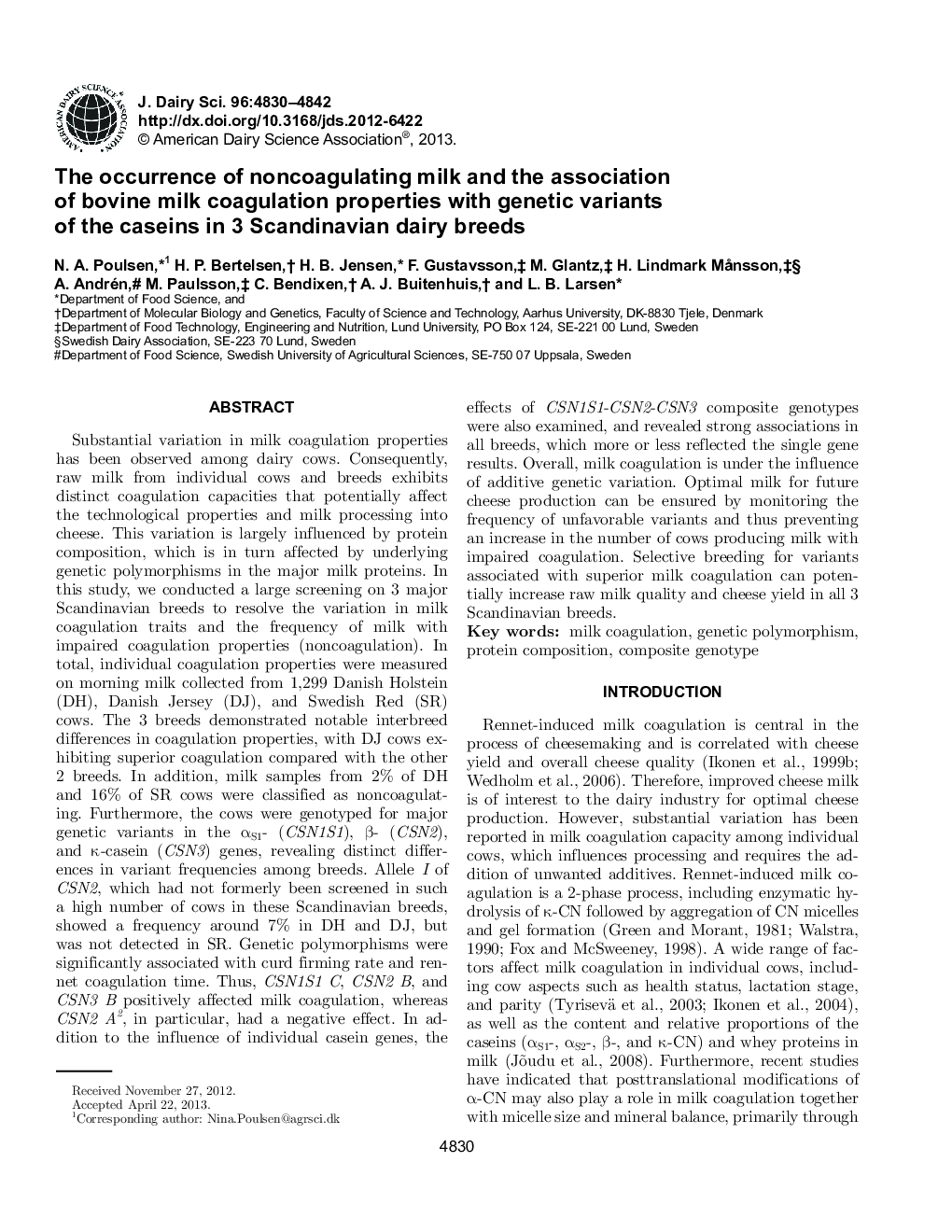| کد مقاله | کد نشریه | سال انتشار | مقاله انگلیسی | نسخه تمام متن |
|---|---|---|---|---|
| 2438864 | 1108051 | 2013 | 13 صفحه PDF | دانلود رایگان |
عنوان انگلیسی مقاله ISI
The occurrence of noncoagulating milk and the association of bovine milk coagulation properties with genetic variants of the caseins in 3 Scandinavian dairy breeds
دانلود مقاله + سفارش ترجمه
دانلود مقاله ISI انگلیسی
رایگان برای ایرانیان
کلمات کلیدی
موضوعات مرتبط
علوم زیستی و بیوفناوری
علوم کشاورزی و بیولوژیک
علوم دامی و جانورشناسی
پیش نمایش صفحه اول مقاله

چکیده انگلیسی
Substantial variation in milk coagulation properties has been observed among dairy cows. Consequently, raw milk from individual cows and breeds exhibits distinct coagulation capacities that potentially affect the technological properties and milk processing into cheese. This variation is largely influenced by protein composition, which is in turn affected by underlying genetic polymorphisms in the major milk proteins. In this study, we conducted a large screening on 3 major Scandinavian breeds to resolve the variation in milk coagulation traits and the frequency of milk with impaired coagulation properties (noncoagulation). In total, individual coagulation properties were measured on morning milk collected from 1,299 Danish Holstein (DH), Danish Jersey (DJ), and Swedish Red (SR) cows. The 3 breeds demonstrated notable interbreed differences in coagulation properties, with DJ cows exhibiting superior coagulation compared with the other 2 breeds. In addition, milk samples from 2% of DH and 16% of SR cows were classified as noncoagulating. Furthermore, the cows were genotyped for major genetic variants in the αS1- (CSN1S1), β- (CSN2), and κ-casein (CSN3) genes, revealing distinct differences in variant frequencies among breeds. Allele I of CSN2, which had not formerly been screened in such a high number of cows in these Scandinavian breeds, showed a frequency around 7% in DH and DJ, but was not detected in SR. Genetic polymorphisms were significantly associated with curd firming rate and rennet coagulation time. Thus, CSN1S1 C, CSN2 B, and CSN3 B positively affected milk coagulation, whereas CSN2 A2, in particular, had a negative effect. In addition to the influence of individual casein genes, the effects of CSN1S1-CSN2-CSN3 composite genotypes were also examined, and revealed strong associations in all breeds, which more or less reflected the single gene results. Overall, milk coagulation is under the influence of additive genetic variation. Optimal milk for future cheese production can be ensured by monitoring the frequency of unfavorable variants and thus preventing an increase in the number of cows producing milk with impaired coagulation. Selective breeding for variants associated with superior milk coagulation can potentially increase raw milk quality and cheese yield in all 3 Scandinavian breeds.
ناشر
Database: Elsevier - ScienceDirect (ساینس دایرکت)
Journal: Journal of Dairy Science - Volume 96, Issue 8, August 2013, Pages 4830-4842
Journal: Journal of Dairy Science - Volume 96, Issue 8, August 2013, Pages 4830-4842
نویسندگان
N.A. Poulsen, H.P. Bertelsen, H.B. Jensen, F. Gustavsson, M. Glantz, H. Lindmark MÃ¥nsson, A. Andrén, M. Paulsson, C. Bendixen, A.J. Buitenhuis, L.B. Larsen,